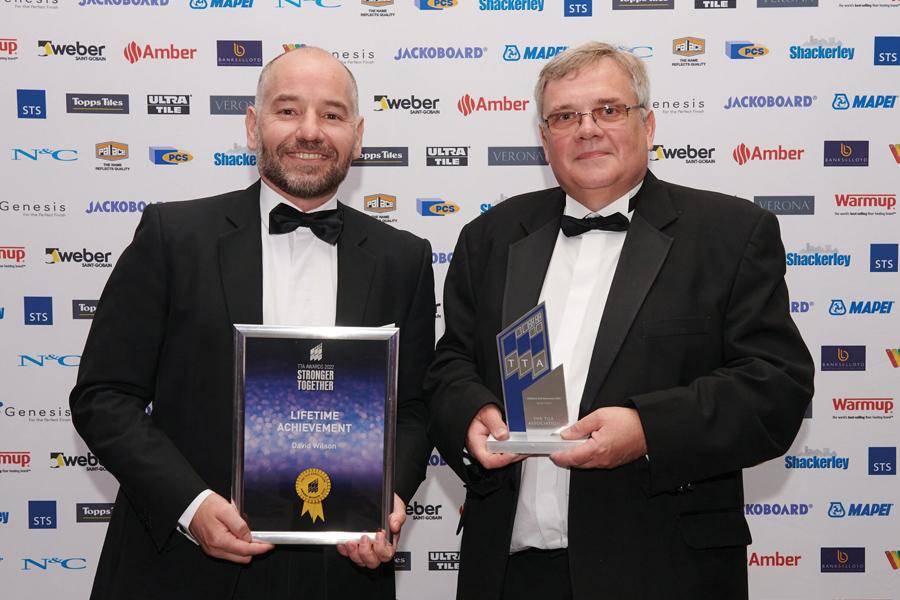At the TTA Awards ceremony, held this past June in Birmingham, the association recognised not only the products and projects that excelled in the industry this year, but the people who made it all happen.
Perhaps most significant among these accolades was the Lifetime Achievement Award, recognising both the lengthy service and multitude of contributions to the industry made by Ardex and BAL’s UK head of standards and specification, David Wilson.
Recently, TSJ spoke with Wilson to discuss his storied 35-year career and what this award means to him. We explored his longstanding efforts to develop and promote high quality standards, the challenges that arise from entering the domain of politicians, as well as some of his broader assessments of where the industry is and where it’s going.
As a graduate chemist with the Royal Society of Chemistry, Wilson began at BAL back in June of 1987. Despite training as an analytical chemist, he was hired as an R&D chemist, working in product development and assisting the quality assurance lab. This pivot was an early example of how flexible and adaptable Wilson would prove to be throughout his career, which after six years at BAL evolved beyond the lab to a customer-facing role as a technical advisor. He’d had some interaction with customers in his first role, where he helped to provide product training, but the technical advisor position represented a significant leap into working with people as well as product.
“That was an on-the-phone job where we took calls from customers – architects, contractors, retailers, or even the general public doing jobs over a bank holiday weekend – so we could really be asked the full gamut of questions,” Wilson recalls. Through this variety, he developed a robust skill set that would serve him throughout his future roles, and also began to see how different people could approach the same topics in wildly incongruous ways. “You gain a lot of experience from talking to people,” he says. “One of the things I find fascinating when people ask questions is: some of them you can predict, but occasionally someone will challenge you by asking a question in a totally new way, or by asking a question that makes you think: Oh, I’ve never thought about that.”
Developing his role in the intervening years, Wilson enmeshed himself further within the industry, working on RIBA CPD presentations, as well as producing technical advice for tiling and writing specifications for architects. Some time later, in 2006, he was promoted to technical services manager at BAL, which saw him managing the company’s entire technical department.
Throughout this period though, Wilson was never content to merely stick to the limits of his job description. For example, in 2005, he joined the TTA’s technical committee, which he describes as a great learning experience. “It was a privilege to work with fellow technical experts in the industry and contribute in a small way to the technical papers we produced, but also to learn from them about parts of the tile industry that I didn’t know a lot about, like slip resistance.”
Following this first foray into the world of regulation and standards, Wilson had the opportunity to join one of the British Standards Institute’s technical committees in 2009, B539. This committee was responsible for developing the suite of standards covering the design and installation of tiling and mosaics and natural stone for floor and walls. And through this role, in 2010, he was even able to join the European standards committee covering products for the installation of ceramic tiles, as one of two UK representatives. Naturally, with the incredible base of technical knowledge he developed over this period, BAL was keen to utilise Wilson in a more directly relevant position, promoting him to UK head of standards and specification in 2019, a role which he continues in today. Not only does he volunteer with the TTA and BSI, he says, “keeping up with legislation and standards is my job now!”
Despite his wealth of experience, the position as head of standards certainly hasn’t come without challenges, Wilson stresses. As with so many pursuits, the judgement of the experts on any given topic doesn’t always align with those in charge of approving the final decisions. “We were working on the Construction4 Products Directive, which then became the Constructions Product Regulation (CPR), but because that became a legal entity in Europe, we found there was a disconnect between the technical committee and what the European Commission wanted from a standard.
That’s an ongoing thing but obviously the committee is still working on achieving the goals the commission wanted to set out.”
Those challenges have only become more complex since 2016 though: “Now of course, as you may remember, we’ve actually left the European Union now…” Wilson says with a chuckle. In a reassuringly level-headed move, however, CEN (Europe’s equivalent to BSI) still wanted BSI to be involved in the creation of standards post-Brexit, which meant Wilson and his colleague remained on the committee. “Of course, when it comes to voting on issues, we don’t have the same weighting anymore,” he points out, “but we can still contribute, and my colleague and I still work towards the standards towards tile adhesives, waterproof tanking systems underneath tiles, and the grout standard.”
For some companies and individuals, there might be some friction caused by an employee working voluntarily on standards development outside of their ordinary job role. After all, a necessary evil of good manufacturing and product standards is the requirement for increased rigour and testing, often leading to potentially higher costs and time investment. Luckily for Wilson, this friction has never existed between BAL and himself. “You’re able to do the standards work because the company allows you to do it. But that’s their commitment, not just to me but to work with the standards and whatever legislation is implemented. Usually the problem is more the disconnect between politicians making decisions that then have to be figured out in the real world!”
One example of these bureaucratic challenges is the distinction between the CE marking and the UK CA marking, which was developed to replace CE markings in Great Britain’s markets after Brexit. While the standards are very similar, and even involve a lot of the same testing, a CE marking verification can’t be achieved using UK testing bodies, and likewise EU testing bodies can’t verify a product for a UK CA marking.
These issues can be frustrating, but Wilson retains a remarkably pragmatic disposition towards the challenges in his line of work. Rather than air yet another inflammatory opinion on Brexit, he prefers to get on with the task at hand. “At the end of the day it wasn’t just my decision, there were a few people involved in it. In my job, I have to deal with whatever comes my way. Anything I can’t influence, there’s not much point worrying about it.”
Likewise, the tumultuous course both global and national geopolitics have undergone over the past several years has done little to dissuade Wilson from keeping a steady focus on improving standards in the industry. “All sorts of changes have happened. I can’t speak for the company as a whole but change is just one of those things you have to accept. Change is inevitable, and it can be a good thing, but it can also be a negative thing. If it’s something that needs exploring further, you can do it through industry bodies like the TTA or BASA (British Adhesives and Sealants Association) which are very helpful.”
Getting even a small insight into Wilson’s encyclopaedic knowledge of the industry – and the impact he’s had on it – it’s not hard to understand why he was chosen for the TTA’s Lifetime Achievement award. It’s his humble and thoughtful reflections on his service, however, that really underscore why he deserves such a recognition. “Having the lifetime achievement is a great honour for me. But I suppose I wouldn’t have been working for as long as I have if I didn’t like working for the company. And they’ve given me the freedom to be able to work on legislation as well. Of course, you don’t get paid for standards, but then why should you? You’re contributing to the industry.”
www.bal-adhesives.com









